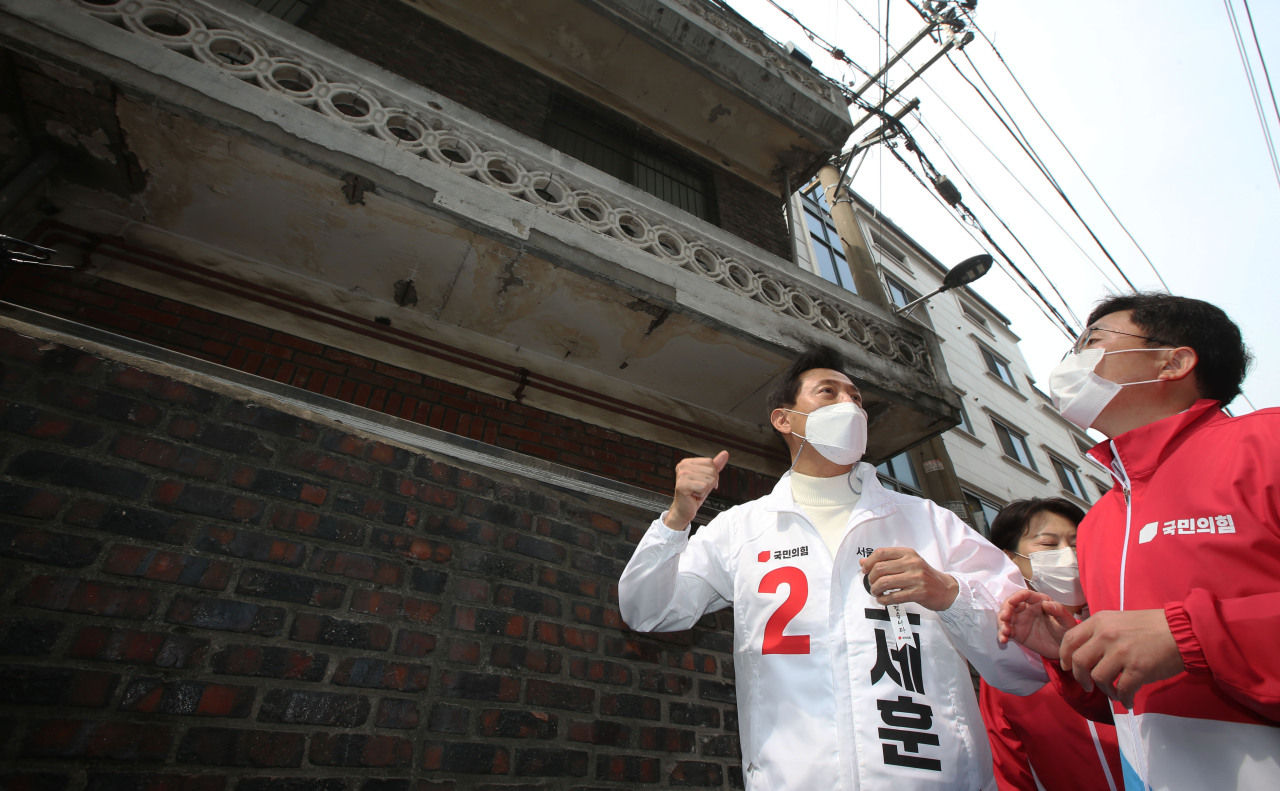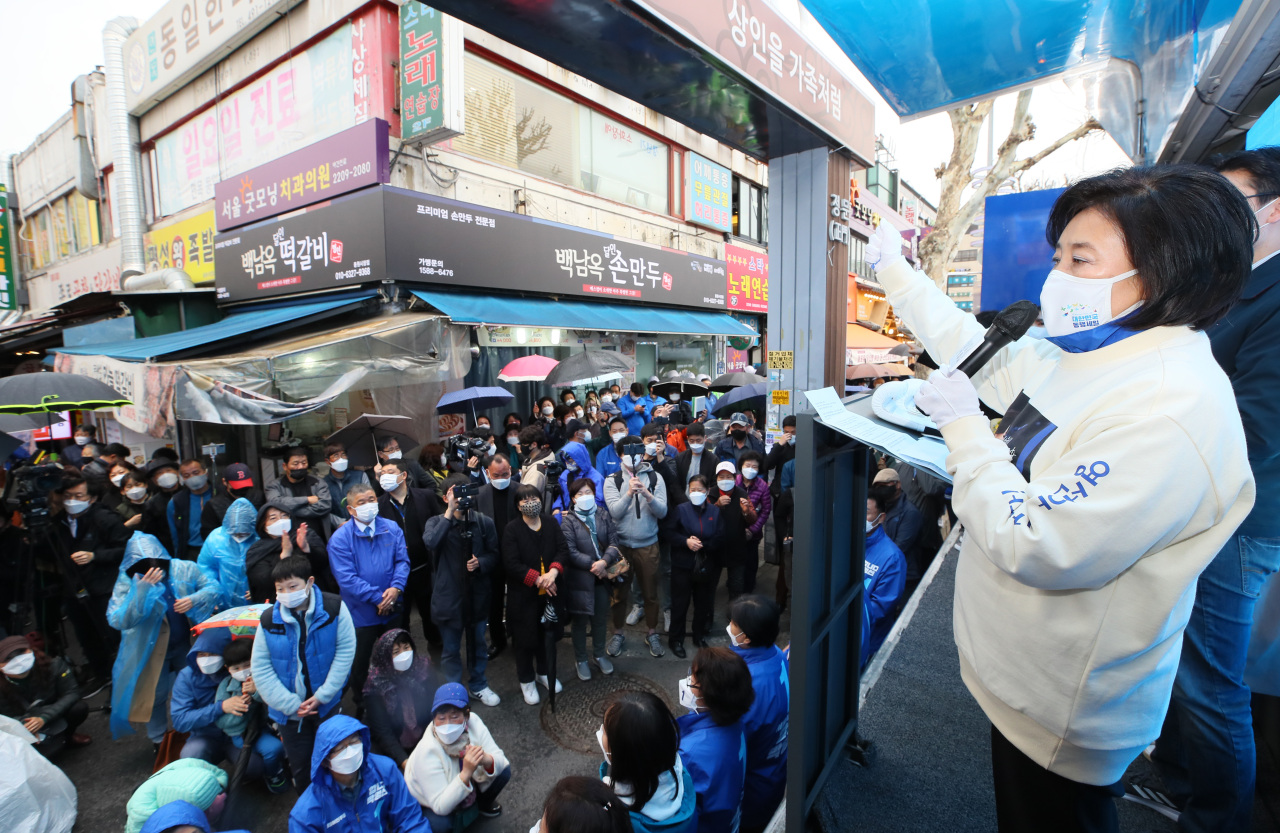[News Focus] Seoul mayoral by-election campaign revolves around real estate plans
By Kim Young-wonPublished : March 28, 2021 - 17:58

Real estate development schemes have taken center stage in the ongoing Seoul mayoral race, with candidates churning out a series of plans to woo voters angry about the central government’s strict regulations that have failed to curb soaring housing prices in the capital.
Oh Se-hoon of the main opposition People Power Party said last week that he would lift restructuring and redevelopment regulations within a week if he is elected as Seoul mayor. He also pledged to supply 360,000 housing units, including 185,000 through restructuring and redevelopment projects, and relax regulations on floor area ratios and the 35-story height restriction in residential areas.
Residents in Yeouido and Apgujeong -- expensive Seoul residential districts where outdated apartments have long been awaiting redevelopment -- have hailed Oh’s pledges regarding real estate redevelopment.
Some of Oh’s plans, however, face potential hurdles. His plan to alleviate the 35-story height regulation and floor area ratios, for example, require approval from the city council, as well as a change of clauses under the National Land Planning and Utilization Act. The city council dominated by the ruling Democratic Party of Korea is not expected to pass bills like Oh’s deregulation schemes.
Quickly observing voters’ sentiment leaning toward Oh, Park Young-sun, the former SME minister from the ruling Democratic Party, on Sunday said she would also loosen some real estate restrictions, allowing long-awaited rebuilding projects for outdated apartments in Gangbuk, a northern Seoul region that is considered less affluent. She also pledged to relax regulations in Gangnam, an upscale southern district of the city, hinting that the direction of real estate policies under her mayoral term would be slightly different from those of President Moon Jae-in.
“In case of pending large-scale projects to rebuild apartments in Gangnam, redevelopment plans will not be only led by the public agencies,” Park said in an interview.
Oh Se-hoon of the main opposition People Power Party said last week that he would lift restructuring and redevelopment regulations within a week if he is elected as Seoul mayor. He also pledged to supply 360,000 housing units, including 185,000 through restructuring and redevelopment projects, and relax regulations on floor area ratios and the 35-story height restriction in residential areas.
Residents in Yeouido and Apgujeong -- expensive Seoul residential districts where outdated apartments have long been awaiting redevelopment -- have hailed Oh’s pledges regarding real estate redevelopment.
Some of Oh’s plans, however, face potential hurdles. His plan to alleviate the 35-story height regulation and floor area ratios, for example, require approval from the city council, as well as a change of clauses under the National Land Planning and Utilization Act. The city council dominated by the ruling Democratic Party of Korea is not expected to pass bills like Oh’s deregulation schemes.
Quickly observing voters’ sentiment leaning toward Oh, Park Young-sun, the former SME minister from the ruling Democratic Party, on Sunday said she would also loosen some real estate restrictions, allowing long-awaited rebuilding projects for outdated apartments in Gangbuk, a northern Seoul region that is considered less affluent. She also pledged to relax regulations in Gangnam, an upscale southern district of the city, hinting that the direction of real estate policies under her mayoral term would be slightly different from those of President Moon Jae-in.
“In case of pending large-scale projects to rebuild apartments in Gangnam, redevelopment plans will not be only led by the public agencies,” Park said in an interview.

She also vowed that the city will supply 300,000 public housing units at a relatively low price of 10 million won ($8,860) per 3.3 square meters.
Under the Moon government, restructuring plans for apartments in Seoul have mostly been halted and delayed as the administration has been trying to prevent developers and alleged speculators from profiteering from property redevelopment. The government has, however, received backlash as prices of apartments have continued to soar due to a shortage of new homes in Seoul.
Reflecting public anger toward the government’s seemingly ill-designed real estate schemes, Park of the ruling party was way behind opposition party candidate Oh in the latest opinion poll.
In a survey of 1,042 eligible voters in Seoul conducted last week by local pollster Realmeter, 48.9 percent of respondents said they would vote for Oh, while only 29.2 percent said they would choose Park as mayor. The by-election, which was made necessary when former Mayor Park Won-soon died by suicide in July last year after facing sexual harassment allegations, is scheduled for April 7.
Some market experts say many of the Seoul mayoral candidates’ housing supply plans would require a significant amount of time and cost to achieve.
“Park’s pledge to build parks, offices and houses on top of some sections of the Gyeongbu Expressway that she hopes to reconstruct under the ground cannot be fulfilled in a year or two, and it costs a huge amount of money,” said Kwon Dae-joong, a real estate professor at Myongji University.
Meanwhile, the growth rate of the average apartment price in Seoul has slowed in recent weeks, after reaching a high of 0.1 percent in the first week of February.
The average price grew 0.06 percent both in the third and fourth week of this month, compared to 0.07 percent in the second week of the same month, and 0.08 percent in the last week of February.
By Kim Young-won (wone0102@heraldcorp.com)
Under the Moon government, restructuring plans for apartments in Seoul have mostly been halted and delayed as the administration has been trying to prevent developers and alleged speculators from profiteering from property redevelopment. The government has, however, received backlash as prices of apartments have continued to soar due to a shortage of new homes in Seoul.
Reflecting public anger toward the government’s seemingly ill-designed real estate schemes, Park of the ruling party was way behind opposition party candidate Oh in the latest opinion poll.
In a survey of 1,042 eligible voters in Seoul conducted last week by local pollster Realmeter, 48.9 percent of respondents said they would vote for Oh, while only 29.2 percent said they would choose Park as mayor. The by-election, which was made necessary when former Mayor Park Won-soon died by suicide in July last year after facing sexual harassment allegations, is scheduled for April 7.
Some market experts say many of the Seoul mayoral candidates’ housing supply plans would require a significant amount of time and cost to achieve.
“Park’s pledge to build parks, offices and houses on top of some sections of the Gyeongbu Expressway that she hopes to reconstruct under the ground cannot be fulfilled in a year or two, and it costs a huge amount of money,” said Kwon Dae-joong, a real estate professor at Myongji University.
Meanwhile, the growth rate of the average apartment price in Seoul has slowed in recent weeks, after reaching a high of 0.1 percent in the first week of February.
The average price grew 0.06 percent both in the third and fourth week of this month, compared to 0.07 percent in the second week of the same month, and 0.08 percent in the last week of February.
By Kim Young-won (wone0102@heraldcorp.com)







![[KH Explains] How should Korea adjust its trade defenses against Chinese EVs?](http://res.heraldm.com/phpwas/restmb_idxmake.php?idx=644&simg=/content/image/2024/04/15/20240415050562_0.jpg&u=20240415144419)










